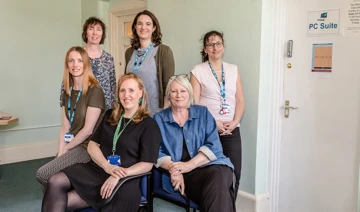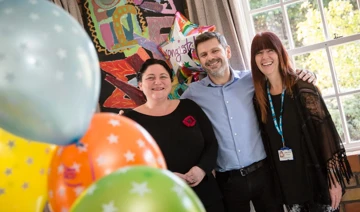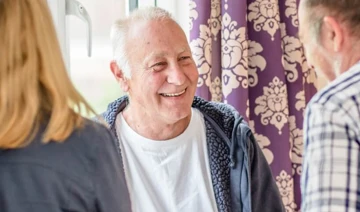From personal trainer to social worker
Date added: 09 March 2021
As part of Social Work Week (8-12 March 2021) we will taking a little time to introduce you to a few of our fantastic mental health social workers that work across our services.
This year’s World Social Work Day (16 March 2021) theme is Úbuntu: I am Because We Are. The word Úbuntu originates from the indigenous people of South Africa and is a concept and philosophy that resonates deeply with the work of social workers because it looks at connecting people and their environments.
John Beckley is a former personal trainer who personalised fitness programmes for his clients; motivating and guiding them to achieve their fitness goals. Now the 37-year-old from London works in our Sevenoaks community mental health service for older people and empowers patients with mental illness and their families and carers to lead fulfilling and independent lives.
John is the first dedicated mental health social worker to work alongside the multi-disciplinary team at Darent House. The team consists of consultant psychiatrists, community psychiatric nurses, occupational therapists, psychologists, support workers, Admiral Nurses and administrative staff. The team work together to provide care for people aged over 65 with a functional mental health difficulty or with dementia including people diagnosed with young onset dementia (aged under 65) in the community.
John started working for Kent and Medway NHS and Social Care Partnership Trust just over eight months ago when the country was experiencing the first wave of the coronavirus pandemic and it hasn’t been easy. John said: “All face-to-face patient appointments were stopped and had to be replaced with telephone and video appointments to help protect and support our most vulnerable patients.
“The current lockdown restrictions have been quite distressing for some of our patients but we have worked to support them in the best way we can.
Some of the people John helps to support are experiencing mental health problems associated with other issues such as physical illness, loneliness and bereavement which is challenging.
John added: “It continues to be tough for many patients, but that is why mental health social workers are vital. We help to support some of the most vulnerable people within our communities with personalised care while encouraging them to look at ways they live more independently through the work we do.
“I work alongside professionals, care homes and carers; providing support and advice and actively guide patients through the different services and resources that are available to them. In normal circumstances, I would signpost older people to voluntary organisations like Age UK who offer day centres and befriending services to help those who may be experiencing loneliness.
“Just having someone they can chat to or accompany them to an activity or the occasional hospital or doctor’s appointment gives them that bit of support or reassurance they may need for every day life in the community.
“What my role gives me is the sound knowledge that I am helping people. They may be losing their memory and slowly forgetting people or their behaviour may be changing. They could even be experiencing bereavement so need help to adjust to their new life; I can help them to do this. My work may include checking for behaviours that may lead to mental health re-lapses or liaising with their GP regarding medication needs – it makes the care I can provide that bit more personal and making those connections and building trust is so important.
“I’m looking forward to eventually having face-to-face meetings with the people I support and continuing to build on the good rapport I have with them. I am committed to working with people’s strengths and using communities as an asset in their recovery to help improve outcomes for people and their loved ones.
“For anyone thinking of training to be a mental health social worker you will find out a lot about yourself - how your strengths can help others. I think of myself as an inquisitive person and this helps me to use this natural quality I possess to find out information from my patients, what they are going through and how best I can help. My role is both rewarding and satisfying and I really love it.”
Úbuntu: I am Because We Are “because it takes a village to support an individual.”




